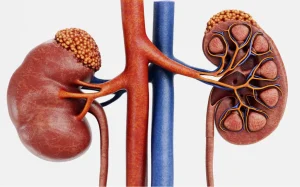RENAL SYSTEM
RENAL SYSTEM

What is the renal system?
The renal system, also known as the urinary system, is a complex network of organs responsible for maintaining the body’s internal balance. At its core are the kidneys, two bean-shaped organs situated on either side of the spine. The kidneys perform vital functions such as filtering waste products and excess substances from the blood, while simultaneously reabsorbing essential nutrients and regulating electrolyte levels.
They also contribute to blood pressure regulation through the renin-angiotensin-aldosterone system and produce hormones like erythropoietin, crucial for red blood cell production. The ureters connect the kidneys to the urinary bladder, where urine accumulates and is held until expulsion. The urethra completes the system, providing a passage for urine from the bladder to exit the body. The renal system’s intricate processes not only maintain fluid and electrolyte balance but also aid in blood pressure control and waste elimination, playing an integral role in overall health and homeostasis.
The renal system, also known as the urinary system, serves as a critical regulatory mechanism for maintaining the body's internal equilibrium. Its main functions encompass a spectrum of vital roles that contribute to overall health. Foremost, the kidneys act as remarkable filtration units, sifting through the blood to eliminate waste products, excess ions, and toxins, subsequently excreted as urine. This waste removal is paralleled by the system's pivotal role in fluid and electrolyte balance, an intricate process that directly impacts cellular function, nerve transmission, and muscle contraction.
Additionally, the renal system plays a paramount part in blood pressure regulation by adjusting blood volume through the management of sodium and water levels. Its involvement in acid-base balance stabilises the body's pH by selectively excreting or retaining ions as needed. Beyond these foundational functions, the kidneys contribute to the production of red blood cells, support bone health through calcium regulation, and even produce hormones that influence bone strength and blood pressure. As an example of multifunctionality, the renal system also aids in the excretion of metabolites and drugs, helps maintain appropriate osmolarity, detoxifies the blood, and ensures the elimination of waste products like urea and creatinine.
Collectively, these interconnected functions underscore the indispensable role of the renal system in maintaining homeostasis, promoting health, and supporting the body's intricate physiological processes.
- Urinary Tract: The urinary tract refers to the system of organs and structures involved in the formation, storage, and elimination of urine from the body. It includes the kidneys, ureters, urinary bladder, and urethra.
- Kidneys: The kidneys are two bean-shaped organs located on either side of the spine, just above the waist. They are crucial components of the renal system and perform a wide range of functions, including filtering waste products from the blood, regulating fluid and electrolyte balance, maintaining blood pressure, producing hormones (such as erythropoietin and renin), and contributing to the production of urine.
- Ureters: These are narrow tubes that connect each kidney to the urinary bladder. They transport urine from the kidneys to the bladder for temporary storage.
- Urinary Bladder: The urinary bladder is a muscular sac that serves as a reservoir for storing urine until it is voluntarily expelled from the body through urination.
- Urethra: The urethra is a tube that carries urine from the urinary bladder to the external environment for elimination. In males, it also serves as a conduit for semen during ejaculation.
- Uric Acid: Uric acid is a chemical compound that is produced as a result of the breakdown of purines, which are substances found in certain foods and cells. Uric acid is normally filtered by the kidneys and excreted from the body in urine.
- Urine: Urine is a liquid waste product produced by the kidneys as they filter the blood. It contains water, electrolytes, and waste substances such as urea, creatinine, and uric acid.
- Nephrons: Nephrons are the microscopic functional units of the kidneys. Each kidney contains millions of nephrons, which are responsible for filtering the blood and producing urine.








